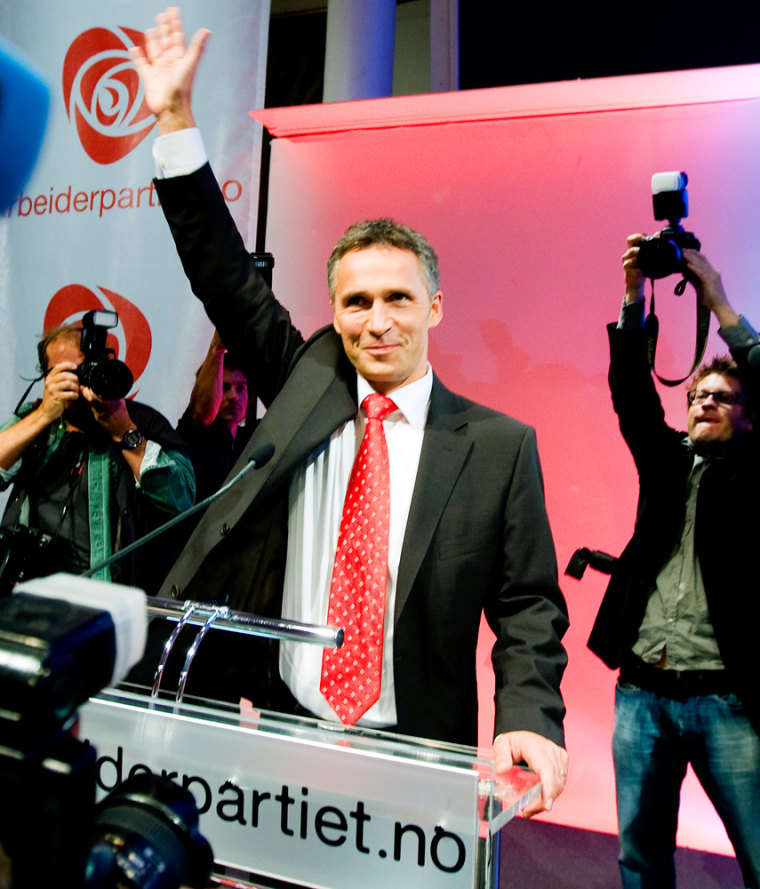Norway's left-leaning government appeared to have narrowly won re-election Monday after using oil money to shield the Nordic welfare state from the global recession, exit polls and near-complete results showed.
If the results are confirmed, it would be the first time a government in Norway has survived an election in 16 years.
An official projection with 98 percent of votes counted showed Prime Minister Jens Stoltenberg's Labor-led coalition winning 86 seats to keep a slim majority in the 169-seat Parliament. Exit polls by broadcasters NRK and TV2 suggested similar results.
"Labor has had a very good election. ... let's hope it's enough to go all the way," Stoltenberg, 50, told a crowd of supporters in Oslo chanting "four more years." He stopped short of declaring victory because the race was very close.
Foreign Minister Jonas Gahr Stoere, also of the Labor Party, said the result indicated Norway would continue to buck a trend that has seen center-right blocs take power in its Nordic neighbors Sweden, Denmark and Finland.
Leaders of the fragmented opposition refused to concede defeat as the results trickled in. Poor results by two small center-right parties appeared to cancel out gains by the Conservatives and the right-wing populist Progress Party.
Escaped financial crisis
Norway has escaped the financial crisis largely unscathed, partly by tapping into its oil- and gas-fueled sovereign wealth fund — currently valued at more than 2.4 trillion kroner ($400 billion). Unemployment stands at 3 percent — among the lowest in Europe.
Oil and gas pumped from North Sea platforms have made the fjord-fringed country of 4.8 million people one of the world's richest nations. But that wealth also presents a challenge for sitting governments, who must balance the risk of overheating the domestic economy with Norwegians' high demands on the cradle-to-grave welfare system.
The last prime minister to win re-election in Norway was Labor's Gro Harlem Brundtland in 1993.
After casting her vote outside Oslo, Progress Party leader Siv Jensen blamed Stoltenberg's government for bad roads, crowded asylum centers and long waiting lists for non-emergency treatment at public hospitals.
"He has not been able to solve the welfare issues he promised to solve four years ago," the 40-year-old candidate told The Associated Press.
Oeystein Nordjordet, a construction worker in Oslo, said Labor's policies were the best for Norway. "Because they are the safest. It's Barack Obama politics, it's exactly the same," he said.
Stoltenberg's camp has also played on the U.S. president's "Yes we can" campaign slogan, with buttons and posters saying "Jens we can" in Norwegian.
Divisions within the opposition
Labor remained Norway's biggest party, winning 64 seats with 35 percent of the vote, the partial results showed. Its junior partners, the Socialist Left and the Center Party, each won 11 seats.
The Progress Party led the opposition parties with 23 percent of votes and 41 seats — its best election result ever.
Divisions within the opposition had raised Stoltenberg's hopes of re-election. Two center-right parties — the Christian Democrats and the Liberals — had ruled out forming a coalition with the Progress Party, mainly because they disliked its immigration policies.
Jensen's party wants stronger demands on immigrants to integrate into Norwegian society and has proposed building Norwegian asylum centers in Africa.
Immigration has skyrocketed by a factor of five since the early 1970s — more than 10 percent of Norway's population is of foreign origin. In recent years the biggest groups of asylum seekers have come from Afghanistan, Iraq, Somalia and Eritrea.
There was virtually no talk about joining the European Union, which Norwegian voters have rejected twice, and whose members on average have been more severely hit by the recession.
